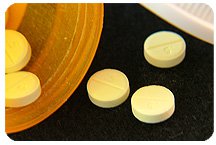Ovulation Induction
Ovulation Induction (OI) is the process of stimulating ovulation. Strictly speaking, OI is only used in women with anovulation, who don’t ovulate regularly on their own.
The cause of the anovulation will determine the best treatment. For example, if a woman is not ovulating because she has a thyroid disorder, correction of the illness should cause her to ovulate.
Medications to induce ovulation
Oral agents for ovulation induction
These medicines are taken by mouth to induce ovulation. The three most commonly used drugs are:
- Clomiphene citrate (Clomid or Serophene)
- Letrozole (Femara)
- Tamoxifen (Nolvadex)
Of these three, clomiphene is the only drug that is specifically FDA-approved for ovulation induction. Letrozole and tamoxifen are FDA approved to treat breast cancer but also happen to promote ovulation.
 Although ovulation induction is an off-label indication for letrozole and tamoxifen use, fertility experts often use these medications, as they may help a couple avoid more costly and risky treatments such as gonadotropin (injectable ovulation medications) medications.
Although ovulation induction is an off-label indication for letrozole and tamoxifen use, fertility experts often use these medications, as they may help a couple avoid more costly and risky treatments such as gonadotropin (injectable ovulation medications) medications.
These three drugs induce ovulation by blocking the action of estrogen (clomiphene and tamoxifen) in an area of the brain called the hypothalamus, or by causing the ovary to make less estrogen (letrozole). Either way, the hypothalamus responds by sending a stronger signal to the pituitary, which then releases increased amounts of FSH and LH – the two hormones responsible for egg growth and, ultimately, ovulation.
To minimize unwanted side effects such as hot flashes and mood swings, the general recommendation is to start with the lowest dose that reliably causes ovulation. Higher doses may hamper the development of the uterine lining and thicken cervical mucus and therefore make it more difficult to get pregnant.
The advantages of oral ovulation induction agents are cost and ease of use. The disadvantage is that of the women whom ovulate with these medicines, only half will become pregnant. The other half will require more intensive therapies.
Our patient Stephanie found family success with Clomid, a simple way to boost her ovulation.
If a woman is not pregnant within six months of treatment with an oral agent, she is much less likely to conceive this way and should seek further guidance from her physician or seek referral to a fertility specialist.
Injectable medications for ovulation induction
Sometimes a woman will not adequately ovulate with an oral medication, and will instead require injections of gonadotropins. Gonadotropins include follicle stimulating hormone (FSH) and luteinizing hormone (LH). These are the hormones released by the pituitary gland to promote egg follicle growth and maturation.
Gonadotropins are frequently used when women do not respond adequately to oral medications. Currently, gonadotropins are only available by injection and women who use them require frequent monitoring in a clinic so that the physicians can measure follicular growth. In other cases, women may require an injection of human chorionic gonadotropin (hCG) in addition to an oral agent.
Human chorionic gonadotropin (hCG) is the hormone of pregnancy, and is almost identical in structure to the hormone LH, which triggers the release of an egg from a mature follicle. It can be used in combination with oral agents or with gonadotropins to promote ovulation. Some of the many uses of hCG in fertility treatments are:
- If a drug like clomiphene can make the follicles grow and mature but not release an egg, hCG can force ovulation.
- hCG can be used to time artificial insemination for women who cannot reliably detect their ovulation with ovulation predictor kits.
- hCG is almost always used to trigger ovulation after the eggs have been stimulated with gonadotropins.
